
Rabindra Sangeet, also known as Tagore Songs, are songs from the Indian subcontinent written and composed by the Bengali polymath Rabindranath Tagore, winner of the 1913 Nobel Prize in Literature, the first Indian and also the first non-European to receive such recognition. Tagore was a prolific composer with approximately 2,232 songs to his credit. The songs have distinctive characteristics in the music of Bengal, popular in India and Bangladesh.
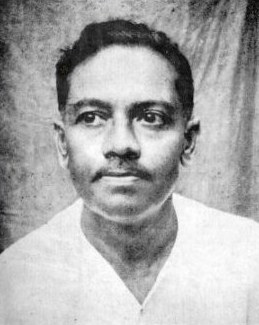
Jibanananda Das was an Indian poet, writer, novelist and essayist in the Bengali language. Popularly called "Rupashi Banglar Kabi'', Das is the most read poet after Rabindranath Tagore and Kazi Nazrul Islam in Bangladesh and West Bengal. While not particularly well recognised during his lifetime, today Das is acknowledged as one of the greatest poets in the Bengali language.

Dwarkanath Tagore was one of the first Indian industrialists to form an enterprise with British partners. He was the son of Ramlochon Tagore, the founder of the Jorasanko branch of the Tagore family. He was also the grandfather of Rabindranath Tagore.

Fakrul Alam is a Bangladeshi academic, writer, and translator. He writes on literary matters and postcolonial issues and translated works of Jibanananda Das and Rabindranath Tagore into English. He is the recipient of Bangla Academy Literary Award (2012) in translation literature and SAARC Literary Award (2012).
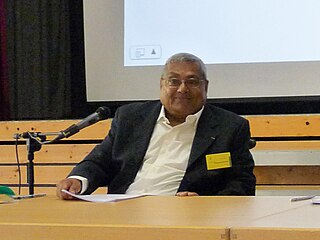
Prithwindra Mukherjee, who retired in 2003 from his career as a researcher in the Human and Social Sciences Department (Ethnomusicology) of the French National Centre of Scientific Research in Paris, is an author of a number of books and other publications on various subjects.
Nastanirh is a 1901 Bengali novella by Rabindranath Tagore. It is the basis for the noted 1964 film Charulata, by Satyajit Ray.

Rabindranath Tagore was a Bengali polymath who worked as a poet, writer, playwright, composer, philosopher, social reformer and painter. He reshaped Bengali literature and music as well as Indian art with Contextual Modernism in the late 19th and early 20th centuries. Author of the "profoundly sensitive, fresh and beautiful" poetry of Gitanjali, he became in 1913 the first non-European and the first lyricist to win the Nobel Prize in Literature. Tagore's poetic songs were viewed as spiritual and mercurial; however, his "elegant prose and magical poetry" remain largely unknown outside Bengal. He was a fellow of the Royal Asiatic Society. Referred to as "the Bard of Bengal", Tagore was known by sobriquets: Gurudev, Kobiguru, Biswakobi.

Buddhadeva Bose, also spelt Buddhadeb Bosu, was an Indian Bengali writer of the 20th century. Frequently referred to as a poet, he was a versatile writer who wrote novels, short stories, plays and essays in addition to poetry. He was an influential critic and editor of his time. He is recognised as one of the five poets who moved to introduce modernity into Bengali poetry. It is said that since Rabindranath Tagore, there has not been a more versatile talent in Bengali literature.

Joe Winter is a British poet, literary critic and translator of poetry. A recent long poem is At the Tate Modern. His translations of the Bengali poets Rabindranath Tagore and Jibanananda Das are published by Carcanet Press, and his versions in modern English of the Anglo-Saxon epic Beowulf and the Middle English poem Pearl are with Sussex Academic Press. SAP has also published Two Loves I Have: a new reading of Shakespeare’s Sonnets and Hide Fox, and All After: What lies concealed in Shakespeare's 'Hamlet'?

Song Offerings is a volume of lyrics by Bengali poet Rabindranath Tagore, rendered into English by the poet himself, for which he was awarded the 1913 Nobel Prize in Literature.
Ghulam Murshid is a Bangladeshi author, scholar and journalist, based in London. He won a number of awards, including Bangla Academy Literary Award in 1982 for his contribution to research.; Prothom Alo Book Award in 2007; IFIC literary prize 2018; the Ekusey Padak for language and literature in 2021 and the Vidyasagar Endowments Lectures 1973 at Calcutta University. Besides being a prolific author, Dr. Murshid is a distinguished lexicographer. He edited a three-volume Bengali dictionary, called 'Bibartonmulak Bangla Abhidhan', published in 2013–2014, by the Bangla Academy. In the two hundred years' of history of Bengali dictionaries, it is the first to be based on historical principles. It provides the evolution of the form and meaning of every word and traces the first use thereof in written Bengali.
Bharoto Bhagyo Bidhata is a five-stanza Brahmo hymn in Bengali language dedicated to Supreme divine God who is the dispenser of the destiny of India. It was composed and scored in Bengali by Nobel laureate Rabindranath Tagore in 1911. The first stanza of the song has been adopted as the National Anthem of India.
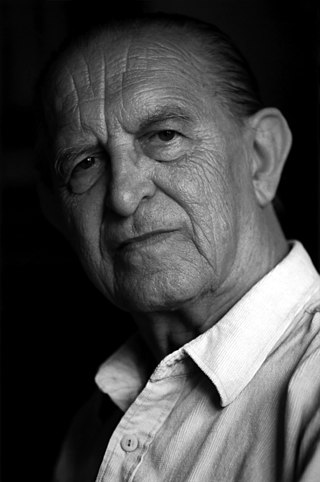
Dušan Zbavitel was a Czech indologist.
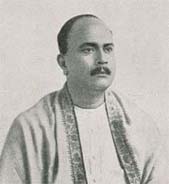
Atul Prasad Sen was a Bengali composer, lyricist and singer, and also a lawyer, philanthropist, social worker, educationist and writer.

Chinmoy Guha is a professor and former Head of the department of English at the University of Calcutta, a Bengali essayist and translator, and a scholar of French language and literature. He has served as the Vice-Chancellor of Rabindra Bharati University and Director of Publications, Embassy of France, New Delhi. Earlier he taught English at Vijaygarh Jyotish Ray College in Kolkata for more than two decades, and French at the Alliance Française and the Ramakrishna Mission Institute of Culture for eleven and five years respectively.
Kabuliwala is a Bengali short story written by Rabindranath Tagore in 1892, during Tagore's "Sadhana" period from 1891 to 1895. The story is about a fruit seller, a Pashtun from Kabul, Afghanistan, who visits Calcutta, India each year to sell dry fruits. While living in India, he develops a filial affection for a five-year-old girl, Mini, from a middle-class aristocratic family, who reminds him of his own beloved daughter back home in Afghanistan.
Ketaki Kushari Dyson is a Bengali-born poet, novelist, playwright, translator and critic, diaspora writer and scholar. Born and educated in Calcutta (Kolkata), India, she has lived most of her adult life near Oxford, U.K. She writes in Bengali and English, on topics as wide-ranging as Bengal, England, the various diaspora, feminism and women's issues, cultural assimilation, multiculturalism, gastronomy, social and political topics.
Martin Kämpchen is an author, translator, journalist and social worker.
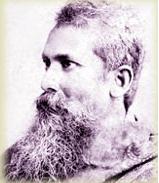
Dwijendranath Tagore was an Indian Bengali poet, song composer, philosopher, mathematician and painter. He was one of the pioneers of shorthand and notation in Bengali script. He was the eldest son of Debendranath Tagore and the eldest brother of Rabindranath Tagore.












